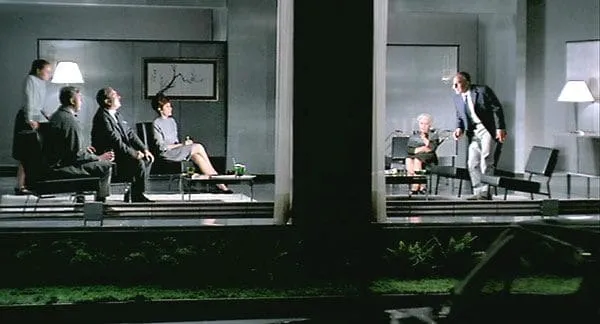Eye For Film >> Movies >> Playtime (1967) Film Review
Playtime
Reviewed by: Amber Wilkinson

Jacques Tati is an architect. He builds his films and scenes with a structural precision from the foundations up, carefully setting his base in place and then gradually layering on the detail, selecting his colour chart of preference - strongly adhered to, even when the film ultimately ended up in black and white as with Jour De Fete - and finally adding embellishment, often where it is least expected. In the case of Playtime he also literally built a kingdom - the well-documented Tativille, a sprawling set covering more than 15,000 square metres and boasting its own power plant that famously cost a packet. This architectural approach is matched by theme in the film, which uses the sleek glass and clean, if clinical, spaces of the mid-Sixties modern world as an environment in which to explore humanity's place in the city and attitudes to interior/exterior - and more particularly personal/private - space.
The themes are there in the foundation of the film, in its opening moments, when we see two nuns walking inside a building, the top corners of their wimples flapping like doves about to take flight. They turn a corner and we realise they are not, in fact, inside the building but outside it, we've been fooled by the first of many reflections that Tati will use to turn the modern streets of Paris into an absurdist hall of mirrors. Glass is a master trickster, sometimes causing confusion or becoming an invisible wall, with people at home viewed as little more than exhibits for us to observe at one point. Occasionally, we see a famous landmark reflected in it, but the characters - even American tourists - seem oblivious to city's sights, lost in an urban maze of Good Home exhibits and fine dining. Glass is also the source of a running joke later in the film, when a state-of-the-art restaurant turns out to be more Fawlty Towers than the Ritz, all the time reflecting our absurdities back at us.

Tati seems to have known no fear as a filmmaker, happy to let scenes run along for minutes before anything of significance happens, at ease with a general lack of plotting and script and more than happy to withhold his key character - Monsieur Hulot - from large chunks of the film. The story, such as there is one sees Hulot (Tati) as the usual hapless innocent abroad, first tackling beauracracy and later sucked into shenanigans at the restaurant.
Tati continually exploits the full depth of frame, sometimes for a lone character, at others, to create a choreographed ballet of mayhem, with the restaurant scenes in particular offering more than enough to warrant multiple viewings for those that care to absorb everything. And it is on that word 'care', that I must sound a note of caution. For though I find Tati the craftsman clever and acute, there is a coolness to Playtime that works against it. Meticulous it may be, but Tati's careful set-ups, particularly in some of the film's early scenes, have a tendency to become tiring and tiresome, especially as the first half of the film has only the most tangentially relationship to the second half. There are moments of brilliance but also points where Tati simply lays on everything too thick. At its best when he hovers closest to reality, there is much to admire but less to outright love.
Reviewed on: 07 Nov 2014


















